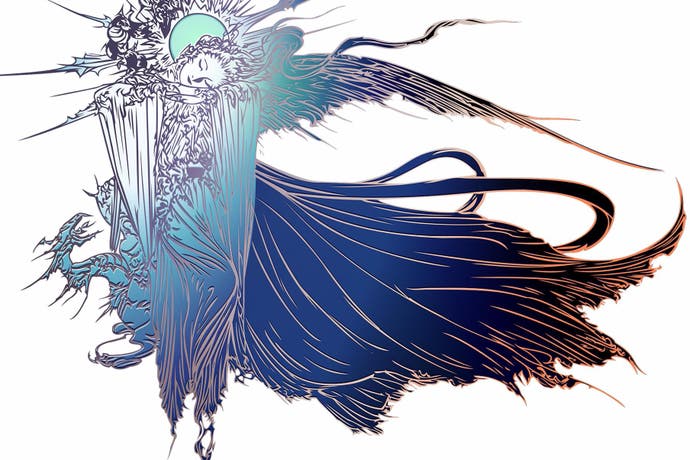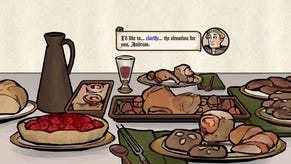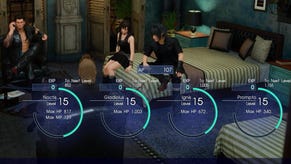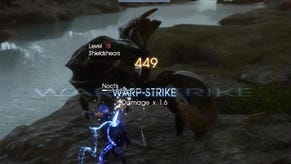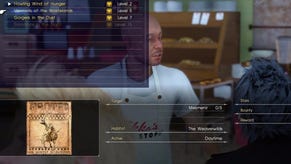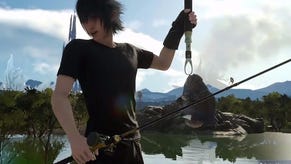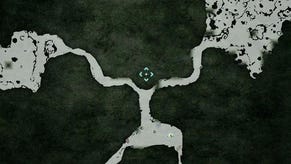The past, present and future of Final Fantasy 15
Hajime Tabata poured his life into getting the JRPG out last year - but he's not done just yet.
It's coming up to a year since Final Fantasy 15 released, but it's not as if work has stopped on Square Enix's epic RPG. Updates keep rolling out, a PC version is in the works - as well as a Switch version, which is still in the very early planning stages - while we're still a chapter away from seeing the expansions, each centred around a member of the game's main cast, being released. It seems the transformation that this game went from, from Final Fantasy Versus 13 to Final Fantasy 15, wasn't the only one it'd see - over the past year, it's shifted from a boxed game with a handful of expansions to a constantly evolving game-as-service.
Hajime Tabata, the director brought onboard to salvage the project when it was still in development limbo, doesn't seem to be showing the strain, though. When we meet at Square Enix's Shinjuku headquarters, he cuts a much more relaxed figure than the one I saw in the tense run-up to Final Fantasy 15's release. He might well do, too - reception may well have been mixed amongst fans and critics, but Final Fantasy 15 was a commercial success. More than that, it's in some way revitalised the Japanese games industry - I'm told there was a collective sigh of relief when this colossal project was safely brought home.
So it's a laid-back chat we had over an hour, talking about the reception to 15, its evolution into a service and what's next for Tabata's team. And he himself still has quite a tale to tell.
It's been a while since we last spoke - I think it was Gamescom a couple of years ago. And you've made a Final Fantasy game since then.
Hajime Tabata: Yeah, a lot's happened since then.
It was a good one as well. I really liked it!
Hajime Tabata: Thank you! I'm glad you liked it. We've also been working really hard to make sure even more people like it.
It even made me cry a bit towards the end - when the Amano artwork faded in, it really got me.
Hajime Tabata: We had a lot of discussions with Mr. Amano about how we'd get that to work, and how we'd proceed with that. We really wanted to have that symbol - the new logo that's about starting a new journey. It'd been ten years since Final Fantasy Versus 13, and we really wanted to show that in a nice way.
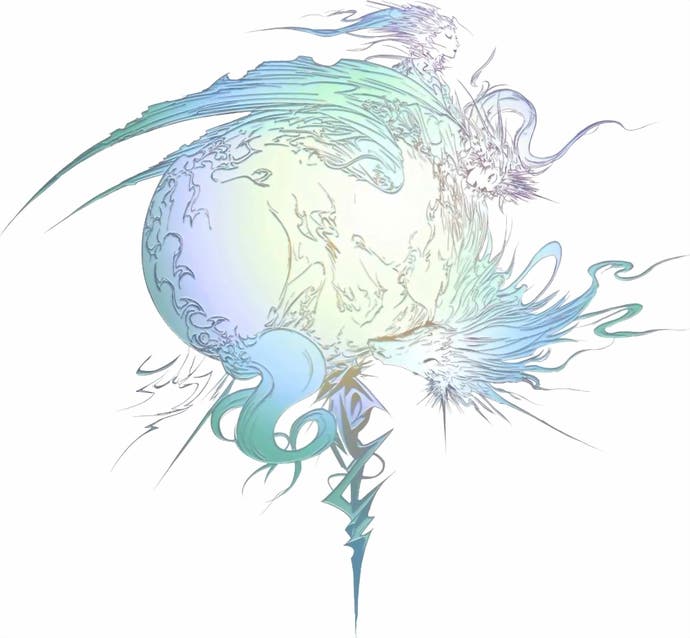
It worked beautifully.
Hajime Tabata: There were a couple of bits with the story that weren't explained as well as they could have been, so we also wanted to generally improve that.
Just generally speaking, what was the experience like of working on a mainline Final Fantasy.
Hajime Tabata: It was certainly much harder than any other project I've ever done in my career - and I learnt a lot more than I had before too. I don't think I've fully digested it yet, not enough to sum it up in one phrase, but certainly it was an experience!
Is it something you'd ever want to put yourself through again?
Hajime Tabata: Hmmm... 50/50! If I was going to do another one again, I'm sure I could do it a lot better next time around. Certainly making a better game as well, getting it out there and making the whole project work - and also the management side, I felt a number of limits and limitations on what I was doing, the way that Japanese companies are structured, the way that the staff are handled and assigned to things. It's a lot of hard work. I think it'd be a big burden - and I'd want to do it a lot better next time.
I think 15 went in a good direction, though. It went very well - it wasn't a Japanese market-based project, it was a global project. We changed a lot the way we made the game and the structure of the team. If we do it again I think we could go even higher, and do more to make it a truly global title.
What were your big regrets, and what would you have liked to have done differently?
Hajime Tabata: When we finished the development of the game, we had no bandwidth left at all. Obviously after it was released you start seeing and thinking about these things - there were a few things we were looking at afterwards, looking back with hindsight, and thinking maybe we could change some things there. And there were other things we wanted to include during the development but couldn't fit in - those were quite separate things really.
The things we really wanted to include from release - but because of scheduling we couldn't - there were two of them really. The first was the off-road Regalia, and the free-driving section - that's something we really wanted in there, but unfortunately couldn't. The other thing was that transition into the second half of the game, into the linear section, we wanted to make that a lot more gradual and softer, rather than an abrupt change. Obviously the things we realised after release - that's something slightly different.
The issues we became aware of, and were concerned about, after release - there's a certain way in the story was presented. Final Fantasy 15, it's not just the main game, there's a variety of other stories and content surrounding that, and I think it was a good idea to do that - it creates a lot of entry points where people can get into the game from - but on the other hand, the people who've only played the main game, there's a feeling that you're missing out on some important part of the story. And even in the main game, the core story of the world, the mythos, it's kind of sparse and missing stuff. That's something we could have done a bit more clearly.
It's an interesting one - I played it on day one, and I feel like I didn't play the complete thing. It's the first game I've played that's had a story patch. That's obviously not something you planned for.
Hajime Tabata: During development, we were working around the clock, putting everything we had into it and really killing ourselves to get the game made. It was a lot of effort - when we completed it and finished it, we felt like we'd put everything into it we could in the time we had, and it was the best result we could have made. When you look back on that, and think we had that limited time period, and our abilities were at a certain point - we were limited in what we could do. Now we've grown and developed as creators - we know how to do things a lot better. There's a feeling that if we do it now we'd be able to do it a lot better, which is why we've switched over to the service model. We want to continue to improve and add on to the game after release - that's the natural progression.
We made quite a lot of money off the game on day one - we made good profits off that - and we thought the best way to use that profit would be to thank the fans who'd played the game, to give back to them and use that to improve their experience. After doing a service model game, you learn a hell of a lot doing that, you realise certain things about games. It's been a rewarding experience doing it like that.
The service model - is it something that happened this time through circumstance. Is it something you'd do again for a narrative experience like Final Fantasy?
Hajime Tabata: There's some things it suits and some things it doesn't. The reason we chose it this time wasn't because it works for a narrative game from a storytelling perspective - it's not going to help with that. It's really that connection with the community and the fans, and rather than having that top-down model and having one point of contact with the fans, we wanted that longer relationship with them, and to keep working with the fans. It's something I think worked well this time, and it's something we've never done before. I've a feeling in the future we'll continue with that longer, extended relationship with the community, and be considering what kind of content we'd provide to them within that longer relationship.
In the final stretch, coming up to the release - I know there was a lot of pressure on getting it out on that date as it'd moved a few times - did you want to ask for another delay?
Hajime Tabata: Honestly, I didn't really think of doing it. The project had been going on for ten years at that point. Projects have a lifespan, and there's a certain limit you can take them to. You talk about limits - the team, the people making the game, they're already way beyond their limits of their stamina and capacity. If I was going to take that away - that psychological pressure - and overwrite that with a new objective and goal, that wouldn't have worked out, so that wasn't an option. There are people out there with the opinion that there's stuff we released after the game came out that should have been there in the start - that's fair enough, and I think it's a fair opinion - but there's just no way we could have done that physically.
Having said that, looking at the team we have now, one year after the game came out, we've powered up so much as game creators. We understand a lot more about the preparations and scheduling required to make things on this scale now, and there's the feeling that we're able to do so many more things. We want to take full advantage of that in the next project.
How big is the active team still working on Final Fantasy 15?
Hajime Tabata: We've split them into several smaller teams - there's those wider expansions, different hardware and different projects. Overall the team is 100, 150 people. There are also outsourcing companies we use working on various projects - if you're talking about the internal staff count, it's probably just under 150.
That's quite an impressive number.
Hajime Tabata: I think people who run full games on that kind of level, they're really experienced. We've just now reached that level.
At what point will you consider Final Fantasy 15 complete?
Hajime Tabata: We've come, ever since the release, together with our fans - so I think it's really about when we can satisfy them and when the game can end and have a proper conclusion to it. We've got a plan up until the end of this year, but looking at that that probably wouldn't satisfy the fans out there. They want more. So I'd like to continue making stuff for the game into next year, and consider what the best way to finish it is and have that big climax next year. So next year, we'll call the end of the journey!
You had the recent in-game survey. What did you learn from it, and what's being actioned as a part of it?
Hajime Tabata: There's so much we learnt, it's hard to sum up! There were people who enjoyed the game, and some who didn't enjoy aspects - we were overwhelmed by the breadth of opinions, and it was much wider than we expected. It was interesting to see what people wanted was so different. I also travelled a lot this year to different events, and I made sure to take time to listen to fan communities about what they liked, what they wanted. Based on those, I've got a plan about how I'd like to continue with Final Fantasy 15 and how I want to bring it to an end.
You've now got a game that's directed by millions of people rather than just by yourself. Is that difficult? And what happens when their vision and your own clashes?
Hajime Tabata: Certainly there is that aspect - even when you're developing before release, you listen to what people want, voices of fans and potential players, and try to reflect that in the game. When you're developing, it's mainly about what the team thinks is the best shape to take. When you release it, it kind of switches over into a different phase - you hear a lot more opinions of people who've played the game, and what they want from it. You're deciding by majority - it's not democratic, but it's more a case of hearing all these opinions, based on that saying what we think the best way of doing things is. It's a different method.
Our plans for the future - there are two tracks. One is based on people that played the game and loved it. It's basically thinking how can we add to that and make it an even greater experience for them. And on the other hand there's people who played it and didn't like it so much - maybe they moved away from it at a certain point. We're trying to work out what the problems there are, how we can fix those and switch it to make something those people might enjoy.
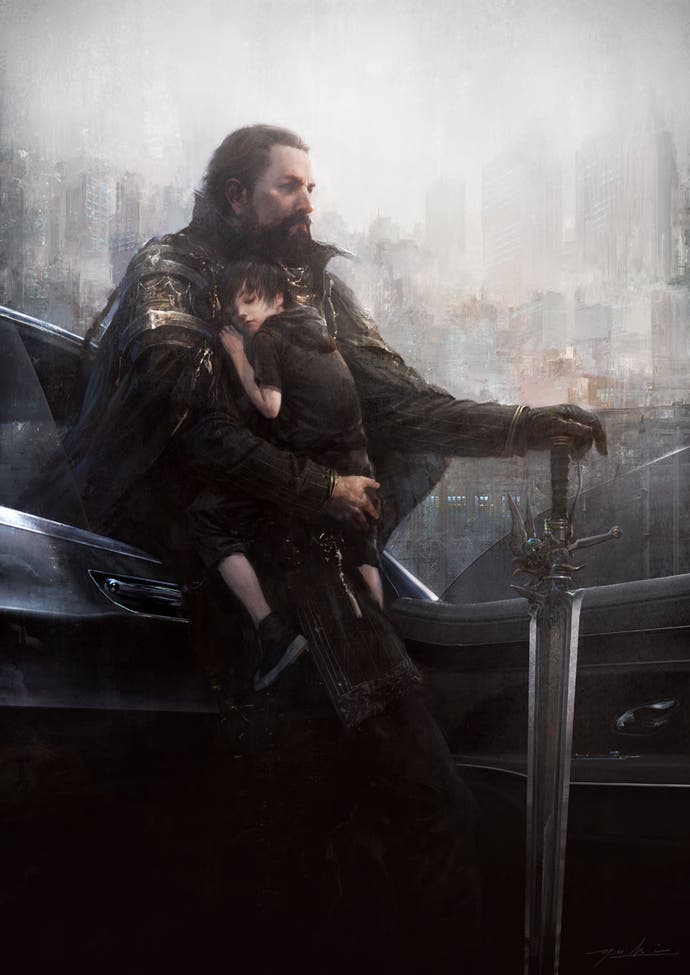
You've got the PC version coming soon too. There are features like first-person, the photo mode. Could that stuff be folded back into the console versions?
Hajime Tabata: Certainly there are a number of features we can't put onto console - anything that involves the Nvidia libraries we can't do, because of the console's limits. The first-person mode we could - that's feasible - and if people want to see that we'll look into it. Thinking on my feet here - it's possible but it would be hard work. That mode's designed for keyboard and mouse, so taking it to console we'd have to re-optimise that for controller support. But we're doing that on PC too though, so....
Will you be using everything from Final Fantasy 15 as a foundation for your next project?
Hajime Tabata: Our new project is very much going to use the Luminous engine. That's the future of the engine - in the mid-term it's being used for the PC version.
You mentioned recently an all-new project being taken on by the team - how many people are working on it right now?
Hajime Tabata: It's still a very small team - we're at the very start of the process, and we're still working out what kind of game we want to make, when we want to get it out, what kind of technological base we want. It's a very small team - at the moment you're looking at 20-30 people.
Ah, so it's still pre-production.
Hajime Tabata: It's not even pre-production yet! We've got quite a lot of the technical investigations sorted for that. We've done a lot of investigation - about how the online functionality will work, moving away from dedicated games machines to cloud processing, how we could use those. A lot of the groundwork was done with Final Fantasy 15 - so we're in a good position for going into the main development.
You say you're targeting next-generation platforms. When exactly do you expect them to arrive?
Hajime Tabata: I can't say anything directly for that! It's very much my own personal intuition when that might be - I've got an idea in my head, but it's not as if I've spoken to Microsoft and Sony and have that kind of information! I'm sure sometime in the future I'll look at Eurogamer and look at an article and see something, think if that's the case I'd better start working on my plan now! We'll probably talk to you before then!
It's a new IP - did you want to make another Final Fantasy, or was it a relief to move on to something fresh.
Hajime Tabata: What I really wanted to do is use everything I learnt from working on Final Fantasy and put it into something new. You don't get that many opportunities in the games industry to make something new when you want, so I really wanted to put everything into that. And also discussing with my boss, Mr. Matsuda , he thinks from a strategic perspective, using the 15 team to do something completely new, it's a very important strategy. It all works out. I'll let you know that we won't be announcing anything for quite a while! I remember what you told me two years ago at Gamescom - without a release date, why did you come to Gamescom! I'm not going to do that again!
It shows a lot of faith from your seniors that they're giving you a new IP. So I take it that the Final Fantasy 15 project has been considered a success?
Hajime Tabata: I think that's the way the project's seen within the company. That's the assessment of how it went, and I'm very happy to hear that. It made a lot of money, and a lot of profit for the company - and that's a good thing. And the challenge of trying new things, and expanding that, that's part of the company's strategic plan. Doing new things based on what we did with 15, is perhaps even more important.
With 15's success, and some of its failures - how do you think that's going to impact the future of Final Fantasy itself?
Hajime Tabata: I think that's something that you guys, the journalists, would understand better than me! You can definitely say the breadth of what you can do with Final Fantasy has been expanded by 15. There are definitely more options for people who are making Final Fantasy in the future. If you look at the reception, who bought the game and the demographics, we've really expanded the audience, and it was great to do that too. 15 is a certain milestone in the series in that way. That's set the groundwork for even greater Final Fantasy games that can exceed 15, too.
Every numbered Final Fantasy tries to take on new challenges - it depends on the team at that time - and the big one we took on with 15 was being this big entertainment spectacle. We did that in some ways, but there's more we could have done with that. To expand on the recognition, and how widely it spread. I think I understand now where that could have gone - and my next project, that's what I'm really aiming for.
Have you handed the keys over to whoever's doing the next one? And will 15 be a foundation for them in any way?
Hajime Tabata: I haven't passed on the keys quite yet! We've obviously still got plans for 15 this year and next year. Also in that sense, 14's still very much going, and very much active. There's more to come yet!
It's not a huge leap of the imagination to think there's a team working on 16 in this building right now. You've got a fair bit of experience with the series now, so what's your one bit of advice for them?
Hajime Tabata: That's a difficult one! I can't think of any one piece of wisdom I could proclaim to them! This might be quite abstract, but what I'd say to them is that if you're going to make a numbered Final Fantasy you've got to put your whole life into it. You've got to put everything into it. It's a job that has that kind of value for your career, and there's fans that are dedicated out there, so you can't do any less for them. My own personal view of Final Fantasy, my expectations for the future, I think it's a series that really opens up the future of gaming - I'd love to see another Final Fantasy in my generation that really opens up and expands the future of gaming in a new way.
